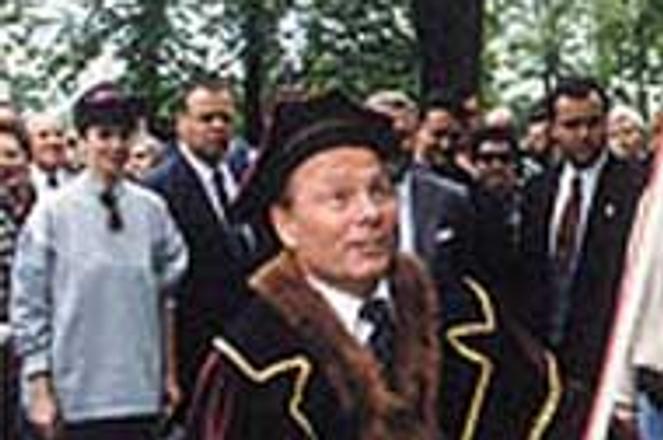Košice mayor and SOP deputy Rudolf Schuster failed to win unanimous coalition support for his presidential candidacy.photo: Peter Brenkus
Although a 1998 election agreement dictates that Košice city mayor Rudolf Schuster must be the presidential candidate of Slovakia's four-party ruling coalition, 28 of 93 coalition deputies in the parliament refused to support his candidacy on the March 31 formal candidacy petition. Their main objections stemmed from Schuster's active communist past.
Most of the objectors came from three branches of the SDK party, a complex five-party coalition pieced together before the last parliamentary election. Christian Democrats (KDH), Democratic Party (DS) members, and Democratic Union (DÚ) deputies said they could not stand behind Schuster.
"The current candidate of the ruling coalition wasn't able to unite all deputies of the parliamentary government majority," said Vladimír Palko, a SDK deputy with the Christian Democrats.
Schuster, however, maintained that his past should not affect his chances.
"My [communist] past is not my problem, it's their problem and they should solve it for themselves," he said.
The coalition agreement was signed by the chairmen of all coalition parties, the Slovak Democratic Coalition (SDK), the former communist SDĽ party, the ethnic Hungarian SMK party and Schuster's Party of Civil Reconciliation (SOP). The agreement stipulates that all coalition members will support Schuster's candidacy in the direct presidential elections, scheduled for May 15 of this year.
Palko said that he had warned about the danger of split support for Schuster before the four parties signed their common coalition agreement in October 1998 after the national elections.
"This [provision on Schuster's candidacy] should have never appeared in [the coalition agreement], because the parliamentary elections were not about who would be the presidential candidate," Palko said.
Another Christian Democrat, František Mikloško, agreed, saying that Schuster was an unacceptable candidate due to his communist past. Schuster was the chairman of the Slovak parliament when communism fell in the former Czechoslovkia in November 1989.
"We [members of the Christian Democratic Movement] who suffered under the communist regime, couldn't just watch in silence after such a compromise [to nominate Schuster for presidency] had been made [by the coalition]," Mikloško said.
Schuster responded that it was too late to open old wounds after the coalition had been formed. "They should have said that before we signed the coalition agreement. If they did not mind then we're former communists, people in the SDĽ or myself, and they were happy that the agreement had been signed, they should keep that in mind now as well," he said.
He added that other politicians should not think that their work was of a higher value than his as a mayor of Košice and as a municipal administrator before 1989.
"Those gentlemen, who often say [that I am an unacceptable candidate] should look at themselves in the mirror and see what they have done in the past nine years for Slovakia, what they have done for the people."
Divided support might have an effect
Focusing on the nomination disagreement as a sign of weakness in the ruling coalition, opposition deputies claimed that open reluctance to support Schuster's candidacy by the SDK deputies was another signal that internal discrepancies in the coalition were hobbling the government.
"This coalition is very incoherent, not only regarding the personal antipathies of its representatives, but also regarding the ideological and political programs of its various parties," said Oľga Keltošová, deputy for the opposition HZDS party.
"If [the coalition] wants to lead Slovakia in terms of foreign policy towards [western alliances], it cannot doubt itself with such acts. It's rather unprofessional," she said.
Even coalition members said they thought the lack of full support for Schuster might effect the outcome of the elections. Schuster's lack of unanimous support would most likely be felt if the presidential election goes into a second round, in which the top two vote getters in from the first round would vie against each other if neither gains a clear majority on May 15.
"The fact that the SDK is not unanimous concerning Schuster's candidacy will affect his popular support in the actual election," Mikloško said. "The interesting thing will be the second round of vote when there will be only two candidates."
Schuster dominates polls
Despite discord in parliament, Schuster has been the clear leader in most pre-election polls. The latest opinion poll conducted by the Focus agency suggested that Schuster would earn 29% of the vote. The Názory polling agency, in its 1395-citizen poll suggested Schuster would be elected with 36.3% of the vote, followed by former theater diva and chairwoman of the Society for Foreign Politics Magda Vášáryová (15.4%).
In February, the Markant agency claimed over 40% of popular support would go to Schuster The second candidate after Schuster, according to Markant, would be Vášáryová with 21%, while the ex-President Michal Kováč would follow with 12%.
The opposition Movement for a Democratic Slovakia (HZDS) had not yet revealed its presidential candidate when The Slovak Spectator went to press.


